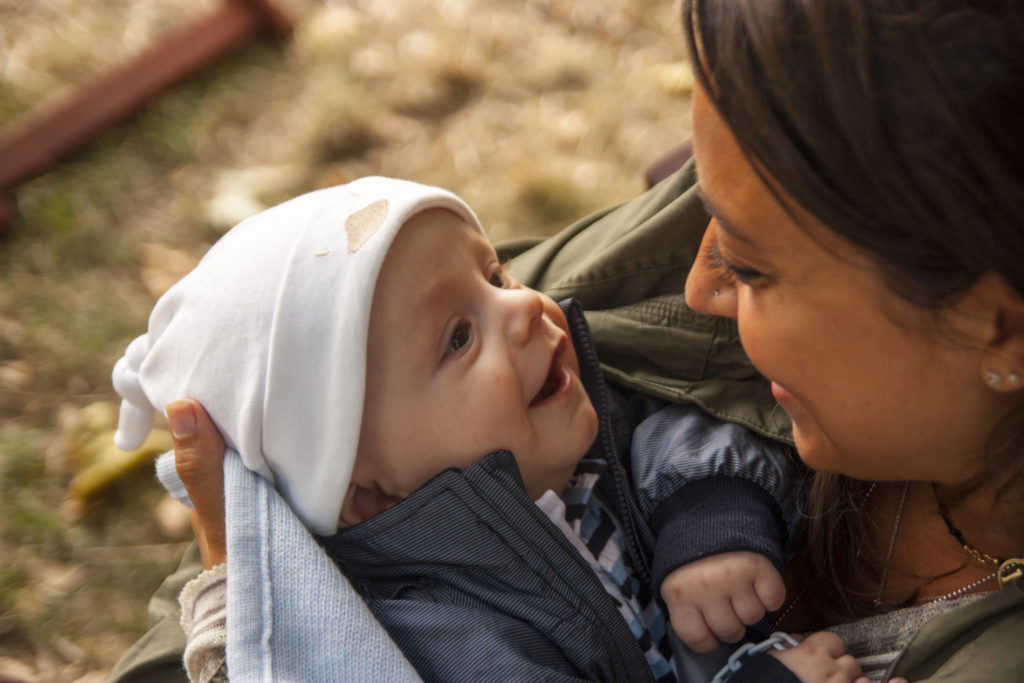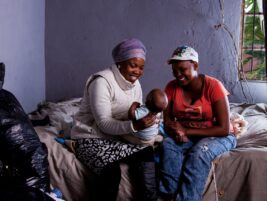Current situation
There has been a recent trend inside the medical world to integrate the various disciplines related with the development and well-being of the child. The traditional dichotomy between soma and psyche is less and less found, and this change leads to the creation of a new anthropological context : during pregnancy, vulnerable families are now more likely to experience, individually or collectively, medical environments that are sensitized to the emotional challenges relating to childbirth, and able to intervene and prevent transgenerational repetition of such emotional challenges.
Despite this positive evolution in the past twenty years, the pathogenic effects resulting from some professional practices still exist. The excessive compartmentalization of services, the dismissal of the emotional aspect of childbirth, the lack of awareness of the physiological processes involved with childbirth, the emotional impact of birth on both mother and baby, and the lack of attention to the father’s role in this process have all been identified as obstacles to the building of adequate family ties, and as potential risk factors for maltreatment. Early mother-infant relationship disorders are often the expression of past conflicts and emotions that have been awakened during pregnancy and the post-partum period. Conversely, the beneficial impact of an individualized intervention during pregnancy is reflected in reduced rate of premature births and more optimal delivery. The benefit of individualized intervention during pregnancy, provided as an integrated multidisciplinary work, is manifested in an improved working alliance with these high-risk families and triggers more secure attachment processes.
Based on these results, the French Ministry of Health gave us a mandate to study the way mental health professionals and the medical staff should collaborate during the perinatal period. This was not an automatic process, because resistance existed on both sides. Indeed, the psychiatric staff was reluctant to recognize the major role played by the nursing staff in the detection and support of vulnerable parents. As a result, in spite of knowing that pregnancy is a period of “psychic transparency”, the potential therapeutic use was left neglected.
A multidisciplinary task force was constituted, and the major issues were identified. A Perinatal Plan for 2005-2007 was prepared, became official on July 5th, 2005, and was aimed at introducing a nationwide change in the organization of perinatal care. For the first time in France, the « emotional security » of pregnant women received the same attention as their « somatic security ». It represented a major shift in both perinatal and psychiatric care. The concept of « emotional security » can also act as a bridge between various child development theories : neurophysiologic, psychoanalytic, attachment, etc. The interest of pediatricians, neonatologists and obstetricians in this field was reinforced by recent studies on prenatal stress. A new method of organization now remains to be defined, so that the emotional needs of the future parents can be taken into consideration in the routine obstetrical follow up.
Proposal
The task force has outlined the following objectives:
1. Open a dialogue early during pregnancy;
2. Offer prenatal interviews with midwives during the first semester;
3. Define the objectives and the content of these interviews, and the necessary training;
4. Make a quantitative and qualitative assessment of the psychological and psychiatric means available in each field;
5. Make medico-psychological cooperation more accessible in maternity and neonatal clinics;
6. Increase the presence of psychologists in maternity;
7. Improve the professional level of the psychologists in maternity, by providing them a more specific training in perinatal-related issues;
8. Ensure the continuity of care by strengthening the links between the psychologist at the maternity, and the Child and Adult psychiatry clinics in the community;
9. Monitor and evaluate the different modalities of psychological /pychiatric interventions through prospective multi-center studies;
10. Develop and build a Network Clinical Work, that would reassemble the medical, social and psychological staffs;
11. Create regional psychological care networks via the CRNs and « distance medical-care » (« télémédecine »);
12. Evaluate the impact of the socalled « indirect » or « second-line » supportive work with the medical staff in the field of « emotional care », and acknowledge them on the administrative level; Learn to « think together », in order to develop the continuity and coherence of the multidisciplinary intervention;
13. De-compartmentalize the training budgets for hospitals, social workers, and the private sector, in order to improve the work with difficult clinical situations;
14. Actively integrate the private sector in prevention policies by promoting innovative arrangements; 15. Create a research group responsible for the training of psychologists and psychiatrists on « second-line » tasks and for the promotion of personalized networks for vulnerable families.
Innovative measures
Three measures were financed at the national level (2005-2008):
Early prenatal interview
A significant budget was assigned to the creation of midwife positions. The opening of a dialogue to enable pregnant women to express their needs and expectations in order to optimize the intervention represents a major change. At first, there was a general reluctance among obstetricians to apply this measure. Physicians feared that, among other things, collaborations with professionals in the psychological and psychiatric fields would be either insufficient or inadequate.
Gradually though, these physicians became convinced that these interviews could facilitate the management of the difficult cases, by combining the skills from the different professionals.
For a mother-to-be to envisage the opening of a positive dialogue about delivery with a “pregnancy professional” is a great opportunity – especially if the mother has low selfesteem, instead of providing her this service via identification as a social and/or psychological high risk mother. The interview is the cornerstone of the individualized intervention, in spite of the need to allocate time and resources for it. The overall benefit is a gain in terms of efficiency.
The very fact of taking time to sit with the pregnant woman and to interview her, has already a positive therapeutic impact, making her feel that she can express herself without being judged, and that her feelings are being taken into consideration. It helps her to see there is an efficient interdisciplinary communication and to feel the management of her clinical condition makes sense. The end-result of this process is the enhancement of a sense of trust in the medico-psychological system.
The main result is that the woman feels having control on her environment at a time when she is going to give birth to a child and create new family ties. This is particularly crucial, especially when one is aware of how often a mother may feel anxious and incompetent – feelings that, more often that not, lead to the phenomenon of postpartum depression. Is there a better modeling intervention that will enable her to let her own child express his/her emotions, feel that he/she is being heard and that his/her environment is adapted to his/her needs?
This initial stage of creating some basic trust in the pregnant woman, then enables the empathic midwife to ask her “Would you find it useful if I called your doctor or your gynecologist ?» This question is aimed at opening up thoughts about ways of « being together » as a couple, as the mother-to-be who at the same time is also asking : « Who am I in the eyes of others when I become a mother, how is my child going to look up to me..? Recognition of each other’s positions, complementarities, understanding each other’s limits – these are the essential issues we wish to address, because they are those very ones that underlie some of the severe early mother-infant relationship disorders. A training manual for this prenatal interview has been produced at the Ministry’s request, in order to support this turning point in the medical world. This manual can be found on the following sites: www.sfmp.net and www.afree.asso.fr.
Expanding the training networks
Following a prospective study on the outcome of children whose mothers had seen a child psychiatrist during the prenatal period, an original mode of training was set in Montpellier. The training is based on the parallel processes of the organization of the family alliance and of the professional team alliance. The special and astonishing impact of these groups of future parents expressing themselves, offers real opportunities for intervention in the area of perinatal mental health. Their main impact is, we think, through the quick activation of the future parents’ internal attachment working systems.
The ultimate goal of this intervention is to promote security and support to the vulnerable pregnant couples, without waiting for difficulties to arise. The prenatal interview is used to tailor the intervention to the individual couple. In complex clinical situations, the fact of having a multidisciplinary team enables to get a comprehensive understanding of the case, with all its medical, psychological and social aspects. Each member of the team then presents his/her intervention, and planning for the next steps is coherent and clear to everyone. During the training sessions, the listeners (professionals with different backgrounds) are prompted to express their views about the case, the goals and means of the intervention, and the expected results. The course of the case will then validate or invalidate their thoughts. Every participant will then listen to the others as they offer their points of view.
This training method, that is based on the therapeutic principle of mutual recognition, facilitates identification with the mother, father and child, as well as with each of the professionals who are likely to intervene.
It has been very useful in detecting and making efficient use of many professional resources, and at this point in time, this training is being spread over, in France as well as abroad.
Substantial funding has been offered for psychologist and child psychiatrist positions in maternity clinics.
Academic courses, specific to the field of perinatal mental health, have also been put in place.
Efforts are still needed for the training of nursing staff, as well as for mental health professionals, in order to reach a more coherent approach, in tune with the expectations of the medical and social teams.
A training manual for setting such networks have been provided, upon the request of the Ministry of Health (www.afree.asso.fr)
Conclusion: Widening and harmonizing the cooperation between professionals from the psychological and medical fields
This model of implementation of a perinatal mental health service, integrated into regular medical maternity departments, is, in our view, a dual process where psychiatrists, as well as medical staff, come to understand they need one another to think comprehensively about the pregnant woman, the father and the infant to come. None of them can do it alone…
Confrontation and integration of the various theories at stake is necessary. This has led to the creation of a Society for Perinatal Psychology, open to all the professionals concerned. These are passionate debates, and the work is still in progress.
Together with these improvements we have tried to describe in this short paper, no doubt we still need to make big efforts to comprehend the complexity of the human nature, in a not less complex environment, especially at those times of intense emotional and physical turmoil, such as pregnancy and delivery…in order to be able to help those families who are in difficulty at that specific turning point of their lives…
Learning to Think Together About Birth: A Major Turning Point in Medical and Psychiatric Culture
Authors
Molénat, F., Child Psychiatrist,
Montepellier University Hospital
France








